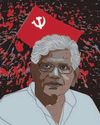By making the spat with the governor public, Mamata Banerjee concedes her failure to control the Basirhat riots.

Subhankar Chatterjee (name changed) is a computer engineer from Baduria in North 24 Parganas district of West Bengal. He is a neighbour of Souvik Sarkar, a 17-year-old student who was arrested for allegedly uploading an offensive post on Facebook on July 2, triggering riots in the area.
I met Subhankar at a coffee shop in Kolkata as he had fled his home because of the riots. “The post was derogatory to Muslims,” said Subhankar. “But Souvik could not have done it. Now there are two accounts in his name,” said Subhankar, who was on Souvik’s friends’ list on Facebook. Both accounts have been deleted. The son of a poor mason, Souvik lost his mother when he was eight. Two of his uncles work in the police department.
“On July 3, I saw a large number of local people entering Souvik’s house. Later, some outsiders raising slogans entered the house, torched a portion of it and stole all valuables,” said Subhankar. The police just about managed to arrest the boy before the attack.
For a few hours after the attack, no one—even Tushar Singha, chairman of the Baduria municipality—could enter the locality. “There were at least 1,000 men. They set fire to a part of the police station and seven police vehicles, after the police refused to hand over Souvik to them,” said Subhankar. Violence spread quickly. Even women were not spared. The attacks, which were initially one-sided, soon turned into a full-fledged communal riot, spreading to other parts of Basirhat.
Baduria is part of the Basirhat subdivision, which has a sizeable Muslim population. “Hindus and Muslims in Basirhat used to be an example for the rest of the country. But that has been shattered,” said Subhankar.
Esta historia es de la edición July 23, 2017 de THE WEEK.
Comience su prueba gratuita de Magzter GOLD de 7 días para acceder a miles de historias premium seleccionadas y a más de 9,000 revistas y periódicos.
Ya eres suscriptor ? Conectar
Esta historia es de la edición July 23, 2017 de THE WEEK.
Comience su prueba gratuita de Magzter GOLD de 7 días para acceder a miles de historias premium seleccionadas y a más de 9,000 revistas y periódicos.
Ya eres suscriptor? Conectar

Themes Of Choice
As Savvy Investors Seek New Avenues, Thematic Mutual Funds Are Gaining Popularity

A golden girl
One of India's most formidable beauties passed away earlier this month. The odd thing is she would absolutely hate this obituary; she hated being written about and avoided publicity for all of her nine decades. Indira Aswani was 93 when she died. But anyone who encountered her, even briefly, was in such awe of her grace and poise, and one could not but remember her forever.

The interest in wine is growing delightfully in India
The renowned British wine writer and television presenter Jancis Robinson, 74, recently came to Delhi and Mumbai to reacquaint herself with India's wine industry. This was the Robinson's fourth visit to India; the last one was seven years ago. On this trip, Robinson and her husband, restaurateur Nicholas Lander, were hosted by the Taj Hotels and Sonal Holland, India's only Master of Wine.

United in the states
Indian-Americans coming together under the Democratic umbrella could get Harris over the line in key battlegrounds

COVER DRIVE
Usage-driven motor insurance policies offer several benefits

GDP as the only measure of progress is illogical
Dasho Karma Ura, one of the world's leading happiness experts, has guided Bhutan's unique gross national happiness (GNH) project. He uses empirical data to show that money cannot buy happiness in all circumstances, rather it is family and health that have the strongest positive effect on happiness. Excerpts from an interview:

India is not a controlling big brother
Prime Minister Tshering Tobgay considers India a benevolent elder sibling as the \"big brotherly attitude\" is happily missing from bilateral ties. He thinks the relationship shared by the two countries has become a model of friendship not just for the region, but for the entire world. \"India's attitude is definitely not of a big brother who is controlling and does not allow the little brother to blossom and grow,\" says Tobgay in an exclusive interview with THE WEEK.

Comrade with no foes
Lal Salaam, Comrade Yechury-you were quite a guy!

Pinning down saffron
In her first political bout, Vinesh Phogat rides on the anti-BJP sentiment across Haryana

MAKE IN MANIPUR
Home-made rockets and weapons from across the border are escalating the conflict